 Petzlover
Petzlover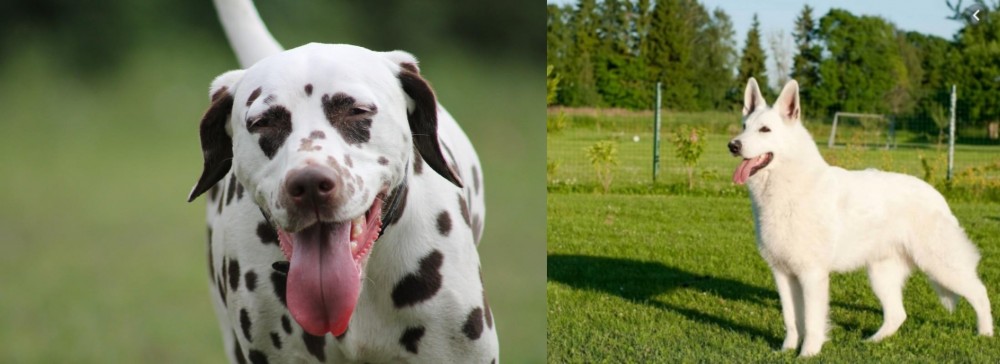 Dalmatian is originated from Croatia but White Shepherd is originated from United States. Both Dalmatian and White Shepherd are having almost same height. Dalmatian may weigh 8 kg / 17 pounds lesser than White Shepherd. Both Dalmatian and White Shepherd has almost same life span. Both Dalmatian and White Shepherd has almost same litter size. Dalmatian requires Low Maintenance. But White Shepherd requires Moderate Maintenance
Dalmatian is originated from Croatia but White Shepherd is originated from United States. Both Dalmatian and White Shepherd are having almost same height. Dalmatian may weigh 8 kg / 17 pounds lesser than White Shepherd. Both Dalmatian and White Shepherd has almost same life span. Both Dalmatian and White Shepherd has almost same litter size. Dalmatian requires Low Maintenance. But White Shepherd requires Moderate Maintenance
 The history of the Dalmatian dog is also fairly scant, and the information you get is often unclear.
The history of the Dalmatian dog is also fairly scant, and the information you get is often unclear.
The name Dalmatian wasn’t used until the end of the 18th century, although it seems as though, according to murals on ancient tombs, there were white hounds then with specks over the body.
It does seem firm that the modern Dalmatian is because of breeding of the English nobility. They used these dogs to accompany them on their carriages. The dogs were also bred with the purpose of getting an exquisite spotted pattern.
It was in 1890 that the first Dalmatian Club was established in England and the dog was recognized by the American Kennel Club in 1888.
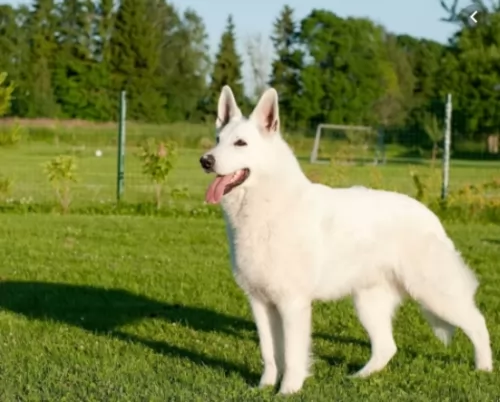 The German Shepherd and the white German Shepherd are the same dog - the only thing is that their coat colors vary.
The German Shepherd and the white German Shepherd are the same dog - the only thing is that their coat colors vary.
The White Shepherd evolved because people were looking for a working companion dog with a high degree of intelligence and a white coat.
The development of the White Shepherd began at the time of the 19th and 20th centuries. A breeding program was started but in 1933, the white coat color was made a disqualification in the German Shepherd Dog breed standard.
Not to be deterred, it was in 1969 that the U.S. and Canada formed White German Shepherd breed clubs and the breed was actually recognized by the UKC in 1999.
 The Dalmatian is a medium sized dog with its beautiful white coat with black or liver spots being its main feature. The coat is short and dense and the Dalmatian pretty much sheds all year round.
The Dalmatian is a medium sized dog with its beautiful white coat with black or liver spots being its main feature. The coat is short and dense and the Dalmatian pretty much sheds all year round.
It is notable that at birth, the puppies are pure white, with their spots starting to form about 4 weeks later.
Both the male and female stand at anything between 56–61cm in height and weigh between 22 to 35kg. He is a slender, muscular dogs with plenty of stamina. The ears of the dog are floppy, he has brown eyes and a long tail.
With his human family, the Dalmatian is an active, playful dog. He has the reputation of being somewhat unfriendly and aloof, but many who have kept him as a pet say this isn't so. He loves to take part in games and gets on well with children in the home.
He is intelligent, but when it comes to strangers, the Dalmatian is reserved and even aloof. If you want to get the best from your Dalmatian, make sure that he is trained and socialized as he then knows how to behave well around people. He makes a good watchdog too.
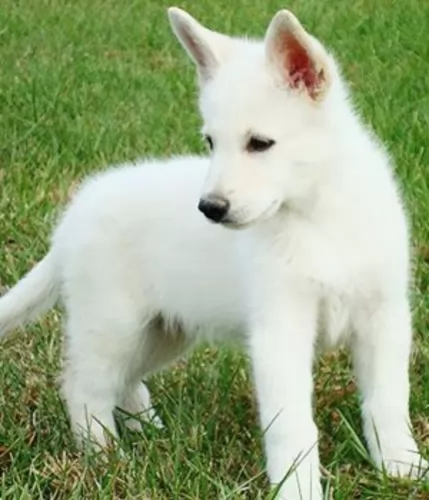 The White Shepherd is a true beauty and is a medium to large-sized dog that is muscular and strong. He stands at between 55 and 65cm in height and weighs between 35 and 40kg.
The White Shepherd is a true beauty and is a medium to large-sized dog that is muscular and strong. He stands at between 55 and 65cm in height and weighs between 35 and 40kg.
He is somewhat longer than tall. The double coat is medium length, dense, straight and white. He is a fairly heavy shedder. He has an intelligent face, a long muzzle and erect ears. The long tail is low-set.
This beautiful dog’s face tells you that he is highly intelligent. He can be easily trained. The bright eyes are eager and alert and he is ready to be an excellent guard dog and take his role as protector and guardian seriously.
The White Shepherd loves his human family and isn't overly enthusiastic around strangers. They’re playful dogs and will make great playmates for children. They also aren’t aggressive with other dogs and will get on well with other pets in the house.
 The Dalmatian is such a beautiful dog, energetic and playful and he is good with pets and children in the home.
The Dalmatian is such a beautiful dog, energetic and playful and he is good with pets and children in the home.
He is intelligent too and training and socialization for him will be easy and promise to bring out all his good points.
The Dalmatian became popular in the 1800's when they were used as coach-dogs, and their popularity has been enhanced because of films from Hollywood such as ‘101 Dalmatians’.
Unfortunately many people receive Dalmatian puppies as gifts after seeing movies like this and then hand their dogs into rescue centers when they grow up and are no longer the cute little puppy they first met.
Be a responsible dog owner. A Dalmatian has feelings and you need to commit to caring for him for up to 15 years. You’ll be rewarded by having a wonderful, loyal canine friend.
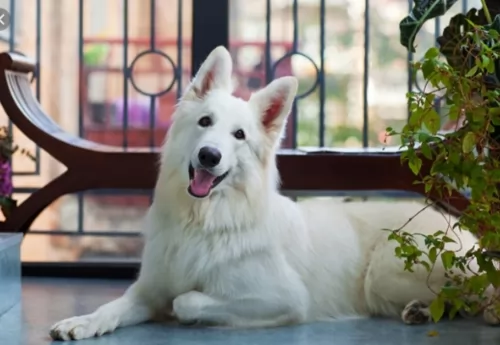 The White Shepherd is such a beautiful dog and he has some great characteristics to match his good looks.
The White Shepherd is such a beautiful dog and he has some great characteristics to match his good looks.
He is friendly and amicable with his human family and is a great protector as well. He isn’t aggressive yet he makes a great watchdog.
He is loving and loyal and forms strong bonds with his human family. Bringing him into your home and heart is guaranteed to confirm the opinion held that dogs are man's best friend.
 Dalmatians, with good care, can live to be about 10 to 15 years. However, just as with other breeds, the Dalmatian is prone to certain health problems that are more specific to their breed. Some of these problems are skin allergies, deafness and urinary stones.
Dalmatians, with good care, can live to be about 10 to 15 years. However, just as with other breeds, the Dalmatian is prone to certain health problems that are more specific to their breed. Some of these problems are skin allergies, deafness and urinary stones.
Dalmatians are known to have sensitive skin and they are prone to topical allergies. When you brush your dog, you should check his skin for redness and also check for fleas and ticks.
Red bumps on his skin could mean an allergy and can be distressing for your pet. Your pet may be scratching excessively and the skin may be red and moist with runny, itchy eyes. It is time to get your dog to the vet, who may prescribe an antihistamines to get the itching and allergies under control.
Unfortunately, the Dalmatian is a dog which has a tendency to form stones in the kidneys and bladder. A genetic mutation causes the raised uric acid levels which is more prevalent with the male Dalmatian. Straining to urinate can be tremendously stressful for your dog and you will need to get him to the vet immediately.
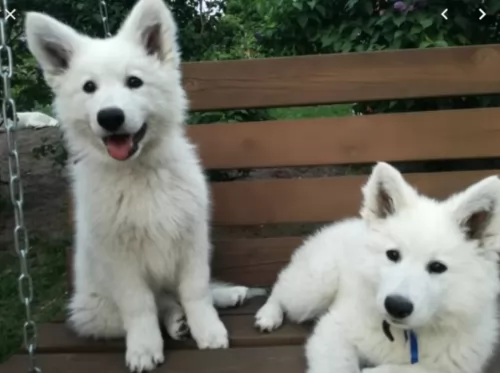 The White Shepherd shares health problems much the same as the German Shepherd, and one of these is hip dysplasia.
The White Shepherd shares health problems much the same as the German Shepherd, and one of these is hip dysplasia.
These dogs are at risk of getting hip dysplasia. It’s a congenital disorder with dogs inheriting the disease from their parents. Some young dogs can get the disease too. Because they are such active dogs, the White Shepherd is at risk of dysplasia. There are a number of signs you can look for in your dog and some of these are -
Your vet may want x-rays to examine your dog's hips. Your vet will want to slow the development of the disease and also ease the pain in your pet. There are other steps the vet will suggest to you that can make it as comfortable as possible for your pet.
 The Dalmatian is an easy dog to maintain and brushing twice a week will get rid of loose hairs. What is notable with the Dalmatian is that not only does he look like a well groomed dog, he also doesn’t have that typical dog smell around him.
The Dalmatian is an easy dog to maintain and brushing twice a week will get rid of loose hairs. What is notable with the Dalmatian is that not only does he look like a well groomed dog, he also doesn’t have that typical dog smell around him.
No matter what kind of dog you have, a high-quality dog food is always beneficial for your dog’s health. Home-made food is always good for your dog and wholesome food such as brown rice, vegetables and some cooked chicken will delight your pet and keep him interested in his food.
There are also excellent manufactured foods and kibble is a good food to have when you select it according to your dog’s age and energy levels.
These foods, especially the top quality ones, ensure your pet gets all the nutrients he needs. Adding some raw meat into the diet can be highly beneficial for your pet and will keep him bright eyed, bushy tailed and with a wet nose.
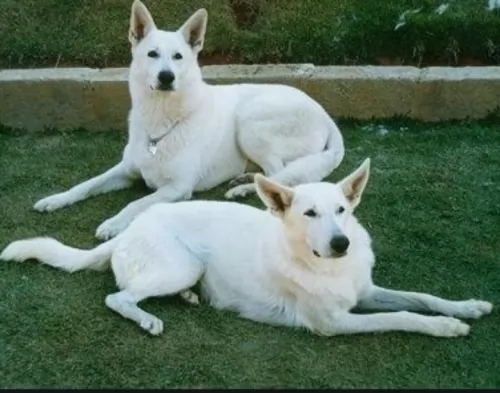 The White Shepherd's weather-resistant double coat will need to be brushed regularly as he is quite a heavy shedder. When brushing him, check for ticks and fleas as well as any unusual lumps.
The White Shepherd's weather-resistant double coat will need to be brushed regularly as he is quite a heavy shedder. When brushing him, check for ticks and fleas as well as any unusual lumps.
This beautiful dog was developed from a herding breed so he is very active. He will love a walk every day but that won’t be sufficient. He just loves ball games, and if you take him to the park, he’ll love you throwing sticks for him or the frisbee.
Because of his intelligence, he will require mental and physical stimulation. You get some toys for dogs where you can put some kibble in the toy and he has to figure out a way to get the food out.
The White Shepherd is an active dog, so to keep him that way, ensure he gets good food which has the right balance of vitamins.
There are good commercially manufactured dog foods on the market, but the idea is to know how to choose the high-quality ones and to avoid the ones that can actually jeopardize your dog’s health.
Always read the write-up on the packaging and choose according to your pet’s age and his activity levels.
It is always a good idea to give such a dog some home-made food too. Not any kind of home-made food either because you have to be careful with dogs to avoid them suffering from abdominal pain. They like their food plain and simple – boiled chicken, brown rice and vegetables.
Some raw meat occasionally is also good. Don’t forget to ensure a constant supply of cool, fresh water.